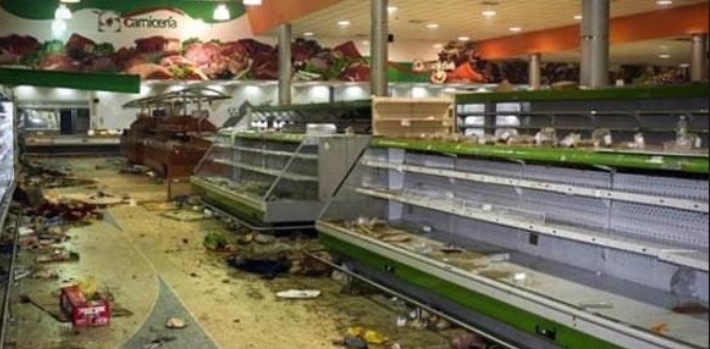
EspañolDespair and violence is taking over Venezuela. The economic crisis sweeping the nation means people have to withstand widespread shortages of staple products, medicine, and food.
So when the Maduro administration began rationing electricity this week, leaving entire cities in the dark for up to 4 hours every day, discontent gave way to social unrest.
- Read More: Venezuela’s Largest Food Producer May Halt over Beer Production
- Read More: Venezuelan Woman Gives Birth while Waiting in Line
On April 26, people took to the streets in three Venezuelan states, looting stores to find food.
Maracaibo, in the western state of Zulia, is the epicenter of thefts: on Tuesday alone, Venezuelans raided pharmacies, shopping malls, supermarkets, and even trucks with food in seven different areas of the city.
Although at least nine people were arrested, and 2,000 security officers were deployed in the state, Zulia’s Secretary of Government Giovanny Villalobos asked citizens not to leave their homes. “There are violent people out there that can harm you,” he warned.
In Caracas, the Venezuelan capital, citizens reported looting in at least three areas of the city. Twitter users reported that thefts occurred throughout the night in the industrial zone of La California, Campo Rico, and Buena Vista.
They assured that several locals were robbed and that there were people on the street shouting “we are hungry!”
The same happened in Carabobo, a state in central Venezuela. Through Twitter, a journalist from Valencia reported the looting of a deli.
The crime took place on Tuesday evening amid a wave of protests against prolonged power rationing and outages in multiple parts of the country.
Food for 15 Days
Supermarkets employees from Valencia told the PanAm Post that besides no longer receiving the same amount of food as before, they must deal with angry Venezuelans who come to the stores only to find out there’s little to buy.
Purchases in supermarkets are rationed through a fingerprint system that does not allow Venezuelans to acquire the same regulated food for two weeks.
Due to the country’s mangled economy, millions must stand in long lines for hours just to purchase basic products, which many resell for extra income as the country’s minimum wage is far from enough to cover a family’s needs.
On Wednesday, the Venezuelan Chamber of Food (Cavidea) said in a statement that most companies only have 15 days worth of stocked food.
According to the union, the production of food will continue to dwindle because raw materials as well as local and foreign inputs are depleted.
In the statement, Cavidea reported that they are 300 days overdue on payments to suppliers and it’s been 200 days since the national government last authorized the purchase of dollars under the foreign currency control system.
Venezuelans Are Eating less
The latest Survey of Living Conditions (Encovi) showed that more than 3 million Venezuelans eat only twice a day or less. The rampart inflation and low wages make it increasingly more difficult for people to afford food.
“Fruits and vegetables have disappeared from shopping lists. What you buy is what fills your stomach more: 40 percent of the basic groceries is made up of corn flour, rice, pasta, and fat”.
But not even that incomplete diet Venezuelans can live on because those food products are hard to come by. Since their prices are controlled by the government, they are scarce and more people demand them.
The survey also notes the rise of diseases such as gastritis, with an increase of 25 percent in 2015, followed by poisoning (24.11 percent), parasites (17.86 percent), and bacteria (10.71 percent).
The results of this study are consistent with the testimony of Venezuelan women, who told the PanAm Post that because “everything is so expensive” that they prefer to eat twice a day and leave lunch for their children. That way they can make do with the little portions they can afford.
Andrea Gutiérrez, for instance, explained that meals at home are becoming smaller. She also buys overpriced milk, which she prefers to give to her children to help them grow healthy.
Since chicken is so expensive, Rosa Morales told the PanAm Post, she only eats breakfast and dinner. She saves the meat for her children’s lunch.
 Versión Español
Versión Español













